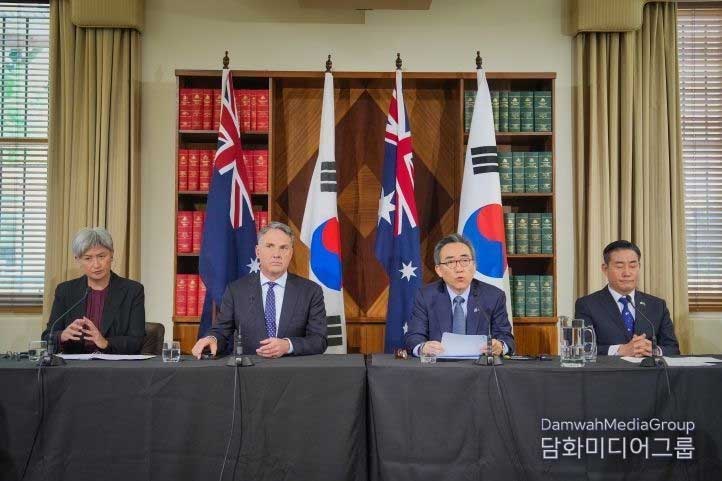Foreign Minister Cho Tae-yul and Defense Minister Shin Won-sik held the 6th Korea-Australia Foreign Affairs and Defense (2+2) Ministerial Meeting with Australian Deputy Prime Minister and Defense Minister Richard Marles and Foreign Minister Penny Wong in Melbourne, Australia on May 1.
They exchanged in-depth views on the Korean Peninsula and regional affairs. Following the meeting, the ministers held a joint press conference and adopted a joint statement as the outcome document of the meeting.
This was the first 2+2 ministerial meeting held since the inauguration of the current governments of both countries and the announcement of the Indonesia-Pacific Strategy, and it was especially significant that it was held in Melbourne, which is adjacent to a defense production facility being built by a Korean company.
The ministers deeply agreed that the extraordinary dedication of the 17,164 Australian military veterans who fought in the Korean War was a solid foundation for the two countries to deepen their cooperation as ‘comprehensive strategic partners’ and agreed to continue to develop bilateral cooperation in a more strategic and future-oriented direction based on the fundamental values of liberal democracy and similar visions for the regional and international arena.
The two sides agreed that each other is a key partner in the implementation of their Indonesia-Pacific strategies, and will continue to work closely together at the bilateral, trilateral, and multilateral levels as the region’s leading similarly situated countries.
The two sides appreciated the remarkable development of defense cooperation between the two countries, including the signing of a contract for the supply of Australia’s next-generation infantry fighting vehicles by Korean companies late last year and the large-scale participation of the Korean military in the “Talisman Sabre” exercises held in Australia last year.
In particular, the two sides agreed that mutually beneficial defense cooperation, including the local production of K-9 self-propelled howitzers and Redback armored vehicles in Australia, will not only strengthen the strength of the Australian Armed Forces but also contribute substantially to the domestic economic development of both countries, and in this context, the Korean side actively explained the superiority of Korean frigates in relation to Australia’s frigate project.
Regarding the situation on the Korean Peninsula, the ministers expressed concern that North Korea continues to threaten the South by conducting nuclear and missile tests, defining the two Koreas as hostile belligerents, and threatening peace and stability not only on the Korean Peninsula but also around the world through illegal military cooperation between Russia and North Korea.
They agreed on the importance of a unified response and coordination by the international community, and agreed to work closely together to drive it, including sending clear messages to North Korea and continuing efforts to cut off North Korea’s illicit sources of funding for nuclear development, including in areas such as cyber and maritime transshipment.
Furthermore, the two sides agreed to work more closely together in their mutually important ASEAN and Pacific regional engagements, and to continue to expand mutually beneficial cooperation in areas such as comprehensive security cooperation, including cyber, as well as economic security, including energy and key minerals, core technologies, and climate change.
In addition, the two sides discussed the situation in the region, sharing their concerns about the recent developments in the Middle East and the war in Ukraine, and agreed to continue to strengthen cooperation by providing humanitarian assistance to the region.
The Korea-Australia Foreign Affairs and Defense (2+2) Ministerial Meeting is considered to be an important opportunity for the two countries to work more closely together to strengthen the regional and global norm-based order based on common values and trust.
